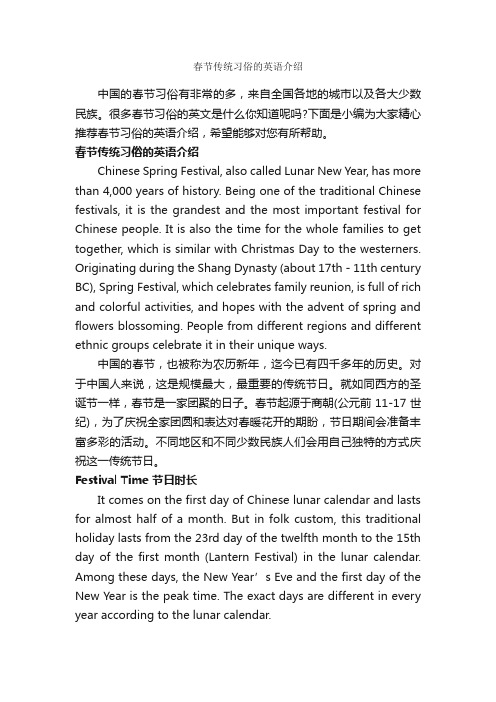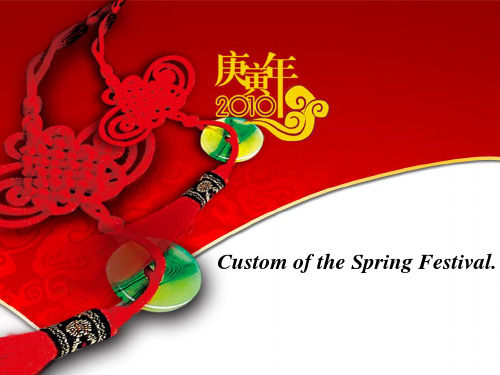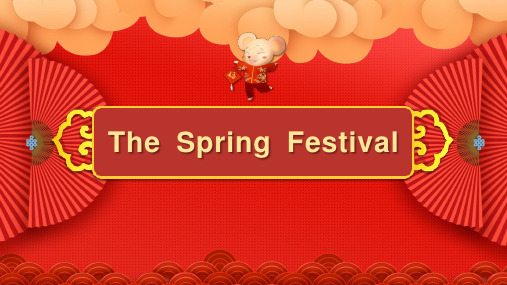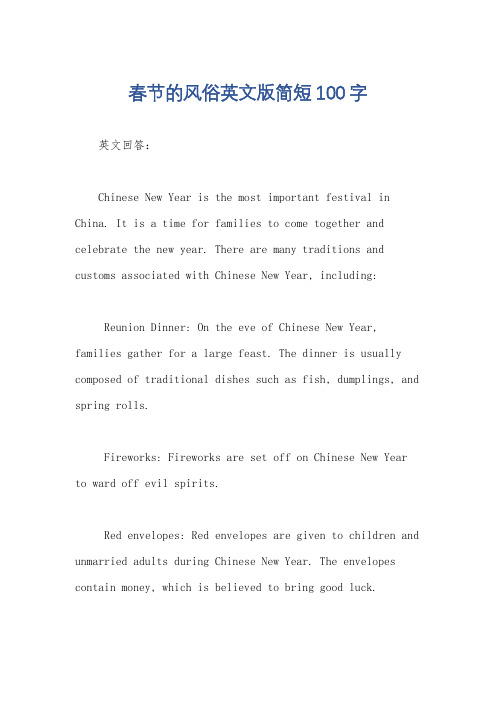春节习俗英文表达63667学习资料
春节传统习俗的英语介绍_春节

春节传统习俗的英语介绍中国的春节习俗有非常的多,来自全国各地的城市以及各大少数民族。
很多春节习俗的英文是什么你知道呢吗?下面是小编为大家精心推荐春节习俗的英语介绍,希望能够对您有所帮助。
春节传统习俗的英语介绍Chinese Spring Festival, also called Lunar New Year, has more than 4,000 years of history. Being one of the traditional Chinese festivals, it is the grandest and the most important festival for Chinese people. It is also the time for the whole families to get together, which is similar with Christmas Day to the westerners. Originating during the Shang Dynasty (about 17th - 11th century BC), Spring Festival, which celebrates family reunion, is full of rich and colorful activities, and hopes with the advent of spring and flowers blossoming. People from different regions and different ethnic groups celebrate it in their unique ways.中国的春节,也被称为农历新年,迄今已有四千多年的历史。
对于中国人来说,这是规模最大,最重要的传统节日。
就如同西方的圣诞节一样,春节是一家团聚的日子。
春节习俗英文表达

春节习俗英文表达春节是中国最重要的传统节日之一,拥有丰富多彩的习俗。
以下是一些常见春节习俗的英文表达:New Year's Eve Dinner(年夜饭)年夜饭是春节前夕一家人团聚在一起享用的丰盛晚餐。
这顿饭通常非常丰盛,包含各种美味的菜肴,象征着家庭的团圆和幸福。
在这顿晚餐中,鱼是必不可少的一道菜,因为“鱼”和“余”同音,象征着“年年有余”。
Spring Festival Couplets(春联)春联通常是红底黑字或红底金字,写在红纸上的吉祥话语。
人们会在春节前夕将春联贴在自家的大门两侧,以迎接新年的到来。
春联的内容通常表达了对新年的美好祝愿和期望。
Fireworks and Firecrackers(烟花和爆竹)放烟花和爆竹是春节期间常见的庆祝活动。
它们响亮的声音和绚烂的色彩被认为可以驱邪避灾,带来好运和欢乐。
然而,由于安全和环保等原因,在一些地区,对燃放烟花和爆竹有一定的限制。
Red Envelopes(红包)红包,也称为压岁钱,通常是长辈在春节期间给晚辈的。
红包通常用红色的信封包装,里面装有一定数额的钱。
红色象征着好运和祝福,给红包意味着祝愿晚辈在新的一年里健康、平安、顺利。
New Year Visits(拜年)大年初一开始,人们会穿上新衣,走亲访友,互相拜年。
拜年时,人们会说一些吉祥的话语,如“恭喜发财”、“新年快乐”等。
这是一种增进亲情和友情的方式。
Lion Dance and Dragon Dance(舞狮和舞龙)舞狮和舞龙是春节期间精彩的表演活动。
舞狮通常由两人合作表演,一人扮演狮子头,一人扮演狮子身。
舞龙则需要多人协作,舞动一条长长的龙形道具。
这些表演充满活力和喜庆,象征着吉祥如意。
Cleaning the House(扫尘)在春节前,人们会彻底打扫房屋,清洗衣物和被褥等。
这一习俗被称为扫尘,意味着扫除过去一年的晦气和厄运,以迎接新的一年的到来。
Worshiping Ancestors(祭祖)春节期间,许多家庭会进行祭祖活动,表达对祖先的尊敬和怀念。
用英语表达春节习俗

⽤英语表达春节习俗⽤英语表达春节习俗(精选13篇) 春节的习俗因地域、民族、⽂化、经济条件的影响,呈现出巨⼤的差异性,也铸就了丰富多彩的传统⽂化。
我们要发扬光⼤这种优秀的传统⽂化,推动⽂化⾛出中国,融⼊世界。
怎样⽤英语告诉外国朋友春节的传统习俗?下⾯是⼩编整理的⽤英语表达春节习俗(精选13篇),希望对⼤家有帮助。
⽤英语表达春节习俗篇1 Chinese Spring Festival celebrating the end of winter and the warmth of spring. It began in the last day of the lunar year, end in the 15th day of lunar New Year, also is the Lantern Festival. During the Spring Festival, people use red lantern and Spring Festival couplets decorate a house, put on all kinds of colored clothes, often visit friends and relatives or together eat dumplings, fish, meat and other delicious food. The children are looking forward to receiving red envelope money, and together they play each other the fireworks, with happy. Street with dragon and lion dance and some other carnival activities, CCTV will held the grand Spring Festival gala. 中国的春节庆祝冬天的结束和温暖春天的来临。
春节习俗英文版学习

Origin of the Spring Festival
The Chinese New Year is now popularly known as the Spring Festival because it starts from the Begining of Spring (the first of the twentyfour terms in coodination with the changes of Nature)。 Its origin is too old to be traced. Several explanations are hanging around. All agree that the word Nian, which in modern Chinese solely means year, was originally the name of a monster beast that started to prey on people the night before the beginning of a new year.
Page 8
Preliminary Eve
The 23rd day of the 12th lunar month is called Preliminary Eve. At this time, people offer sacrifice to the kitchen god. Now however, most families make delicious food to enjoy themselves. After the Preliminary Eve, people begin preparing for the coming New Year. This is called "Seeing the New Year in".
春节习俗英文简介_春节习俗有哪些

春节习俗英文简介_春节习俗有哪些春节是我国最重要的传统节日之一,春节文化历史悠久,关于春节的习俗数不胜数。
店铺为大家介绍一下关于春节习俗的英语介绍,欢迎大家阅读。
中国春节的英文介绍Spring Festival is the most important holiday for Chinese people. Excitement and happiness are palpable this time of the year,and they reach the peak on lunar new year‘s eve.春节对于中国人来说是最重要的节日。
在每年的春节都让人兴高采烈,尤其是大年三十那晚,更是达到了高潮。
Though the 15-day period, which starts with the first day of the lunar new year and ends on the 15th day (known as Lantern Festival), is relatively long, it is the busiest time of the year for Chinese people. The arrangements they have to make for family reunions,buying necessities and preparing food keeps them busy throughout the holiday. Many of them travel back home and meet friends over dinner and drinks. The celebrations include decorating the house and setting off fireworks.春节历时15天,也就从大年初一开始,到元月十五元宵节结束。
有关春节习俗英文介绍

02 Customs of the Spring Festival
1. The spring festival transportation (春运)
提起春运,人们首先出现在脑海的印象就是人 多拥挤,票难买 When it comes to Spring Festival travel, the first thing that comes to mind is that people are crowded and tickets are hard to buy.
There are many legends about the origin of the Spring Festival. One legend goes that there was an extremely cruel beast named “Nian”, which had a very big mouth that would hurt people once a year on the new year eve. People were very scared.
In addition to pasting paper-cuts on windows, it is common for Chinese to paste the character “fu(福)”on walls or doors. “Fu” shows people’s yearning toward a good life. Some people even invert the character “fu” means "fu" arrive in Chinese.
3. Sweeping the Dust(扫尘)
“Dust” is homophonic with “chen”( 尘 )in Chinese , which means old and past. This custom shows a good wish of putting away old things to welcome a new life. Before the New Year comes, people will completely clean the inside and outside of their house.
春节的风俗英文版简短100字

春节的风俗英文版简短100字英文回答:Chinese New Year is the most important festival in China. It is a time for families to come together and celebrate the new year. There are many traditions and customs associated with Chinese New Year, including:Reunion Dinner: On the eve of Chinese New Year, families gather for a large feast. The dinner is usually composed of traditional dishes such as fish, dumplings, and spring rolls.Fireworks: Fireworks are set off on Chinese New Year to ward off evil spirits.Red envelopes: Red envelopes are given to children and unmarried adults during Chinese New Year. The envelopes contain money, which is believed to bring good luck.Lion and dragon dances: Lion and dragon dances are performed on Chinese New Year to bring good luck and fortune.Visiting relatives and friends: During Chinese New Year, people visit their relatives and friends to wish them a happy new year.中文回答:春节是中国最重要的节日。
春节习俗的英文资料整理

让知识带有温度。
春节习俗的英文资料整理春节习俗的英文资料春节习俗的`英文资料Chinese New Year or Spring Festival is the most important of the traditional Chinese holidays. It is sometimes called the Lunar New Year by English speakers. The festival traditionally begins on the first day of the first month (Chinese: 正月; pinyin: zhēng yuè) in the Chinese calendar and ends on the 15th; this day is called Lantern Festival. Chinese New Years Eve is known as chú xī. It literally means Year-pass Eve.Chinese New Year is the longest and most important festivity in the Lunar Calendar. The origin of Chinese New Year is itself centuries old and gains significance because of several myths and traditions. Ancient Chinese New Year is a reflection on how the people behaved and what they believed in the most.Celebrated in areas with large populations of ethnic Chinese, Chinese New Year is considered a major holiday for the Chinese and has had influence on the new year celebrations of its geographic neighbors, as well as cultures with whom the Chinese have had extensive interaction. These include Koreans (Seollal), Tibetans and Bhutanese (Losar), Mongolians (Tsagaan Sar), Vietnamese (Tt), and formerly the Japanese before 1873 (Oshogatsu). Outside of Mainland China, Hong Kong, Macau, and Taiwan, Chinese New Year is also celebrated in countries with significant Han Chinese populations, such as Singapore, Indonesia, Laos, Malaysia, the Philippines, and Thailand. In countries such as Australia, Canada and the United States, although Chinese New Year is not an official holiday, many ethnic Chinese hold large celebrations and第1页/共2页千里之行,始于足下。
- 1、下载文档前请自行甄别文档内容的完整性,平台不提供额外的编辑、内容补充、找答案等附加服务。
- 2、"仅部分预览"的文档,不可在线预览部分如存在完整性等问题,可反馈申请退款(可完整预览的文档不适用该条件!)。
- 3、如文档侵犯您的权益,请联系客服反馈,我们会尽快为您处理(人工客服工作时间:9:00-18:30)。
Chinese New Year Celebration is the most important celebration of the year. Chinese people may celebrate the Chinese New Year in slightly different ways but their wishes are almost the same; they want their family members and friends to be healthy and lucky during next year.春节庆祝活动是一年中最重要的庆祝活动。
中国人庆祝春节的方式可能略微不同,但其愿望几乎是相同的,他们希望其家人和朋友来年健康和幸运。
Chinese New Year Celebration usually lasts for 15 days. Celebratory activities include Chinese New Feast, firecrackers, giving lucky money to children, the New Year bell ringing and Chinese New Year Greetings. Most of Chinese people will stop the celebrating in their home on the 7th day of New Year because the national holiday usually ends around that day, however celebrations in public areas can last until the 15th day of New Year.春节庆祝活动通常持续15天。
庆祝活动包括春节的年夜饭,放鞭炮,给儿童压岁钱,春节钟声和春节问候。
大多数中国人将在春节的第7天停止庆祝活动,因为全国性节假通常在这一天结束,但在公共场所的庆祝活动可能最终持续到正月十五。
House Cleaning房屋打扫To clean houses on the New Year Eve is a very old custom dating back to thousands of years ago. The dust is traditionally associated with “old” so cleaning their houses and sweeping the dust mean to bid farewell to the “old” and usher in the “new”. Days before the New Year, Chinese families clean their houses, sweeping the floor, washing daily things, cleaning the spider webs and dredging the ditches. People do all these things happily in the hope of a good coming year.春节打扫房屋这个非常古老的习俗甚至可以追溯到几千年前。
灰尘在传统上与“旧”联系在一起,所以打扫房屋和扫除灰尘意味着辞“旧”迎“新”。
春节的前几天,中国的各家各户都打扫房屋,扫地,清洗日用品,清除蛛网和疏浚沟渠。
人们兴高采烈做所有这些事情,希望来年好运。
House decoration房屋装饰One of the house decorations is to post couplets on doors. On the Spring Festival couplets, good wishes are expressed. New Year couplets are usually posted inpairs as even numbers are associated with good luck and auspiciousness in Chinese culture.房屋装饰之一就是在门上贴对联。
在春联上,抒发良好的祝愿。
春联通常是成对张贴,因为双数在中国文化中是好运气和吉祥的象征。
People in north China are used to posting paper-cut on their windows. When sticking the window decoration paper-cuts, people paste on the door large red Chinese character “fu”A red "fu"means good lu ck and fortune, so it is customary to post "fu"on doors or walls on auspicious occasions such as wedding, festivals. 在中国北方,人们习惯于在窗户上贴剪纸。
人们既在窗户上贴剪纸,又在大门上贴上大大的红色汉字“福”字,一个红色“福”字意味着好运和财富,因此习惯上在婚礼,节日之类的吉祥场合中,人们都会在门或墙上贴“福”字。
Waiting for the First Bell Ringing of Chinese New Year等待春节的第一声钟鸣The first bell ringing is the symbol of Chinese New Year. Chinese people like to go to a large squares where there are huge bells are set up on New Year’s Eve. As the New Year approaches they count down and celebrate together. The people believe that the ringing of huge bell can drive all the bad luck away and bring the fortune to them. In recent years, some people have begun going to mountain temples to wait for the first ringing. Hanshan Temple in Suzhou, is very famous temple for its first ringing of the bell to herald Chinese New Year. Many foreigners now go to Hanshan Temple to celebrate Chinese New Year.第一次钟声是春节的象征。
中国人喜欢到一个大广场,那里有为除夕设置的大钟。
随着春节的临近,他们开始倒计数并一起庆祝。
人们相信了大钟的撞响可以驱除霉运,带来好运。
近年来,有些人开始去山上寺庙等待第一次钟声。
苏州的寒山寺就非常著名,它的钟声宣布春节的到来。
现在有许多外国人也去寒山寺庆祝春节。
Staying up late ("Shousui")熬夜(“守岁”)Shousui means to stay up late or all night on New Year's Eve. After the great dinner, families sit together and chat happily to wait for the New Year’s arrival.守岁意味着除夕夜不睡觉。
年夜饭后,家人聚坐一起,愉快聊天,等待春节的到来。
New Year Feast年夜饭Spring Festival is a time for family reunion. The New Year's Feast is "a must" banquet with all the family members getting together. The food eaten on the New Year Eve banquet varies according to regions. In south China, It is customary to eat "niangao" (New Year cake made of glutinous rice flour) because as a homophone, niangao means "higher and higher every year". In the north, a traditional dish for the feast is "Jiaozi" or dumplings shaped like a crescent moon.春节是与家人团聚的时间。
年夜饭是所有家庭成员聚在一起“必须”的宴会。
除夕宴会上吃的食物根据不同的地区各不相同。
在中国南方,习惯吃“年糕”(糯米粉制成的新年糕点),因为作为一个同音字,年糕意味着“步步高升”。
在北方,年夜饭的传统饭是“饺子”或像月牙儿形的汤圆。
Setting Firecrackers燃放鞭炮Lighting Firecrackers used to be one of the most important customs in the Spring Festival celebration. However, concerning the danger and the negative noises that lighting firecrackers may bring, the government has banned this practice in many major cities. But people in small towns and rural areas still hold to this traditional celebration. Right as the clock strikes 12 o'clock midnight of New Year's Eve, cities and towns are lit up with the glitter from fireworks, and the sound can be deafening. Families stay up for this joyful moment and kids with firecrackers in one hand and a lighter in another cheerfully light their happiness in this especial occasion, even though they plug their ears.放鞭炮曾是春节庆祝活动中最重要的习俗之一。
